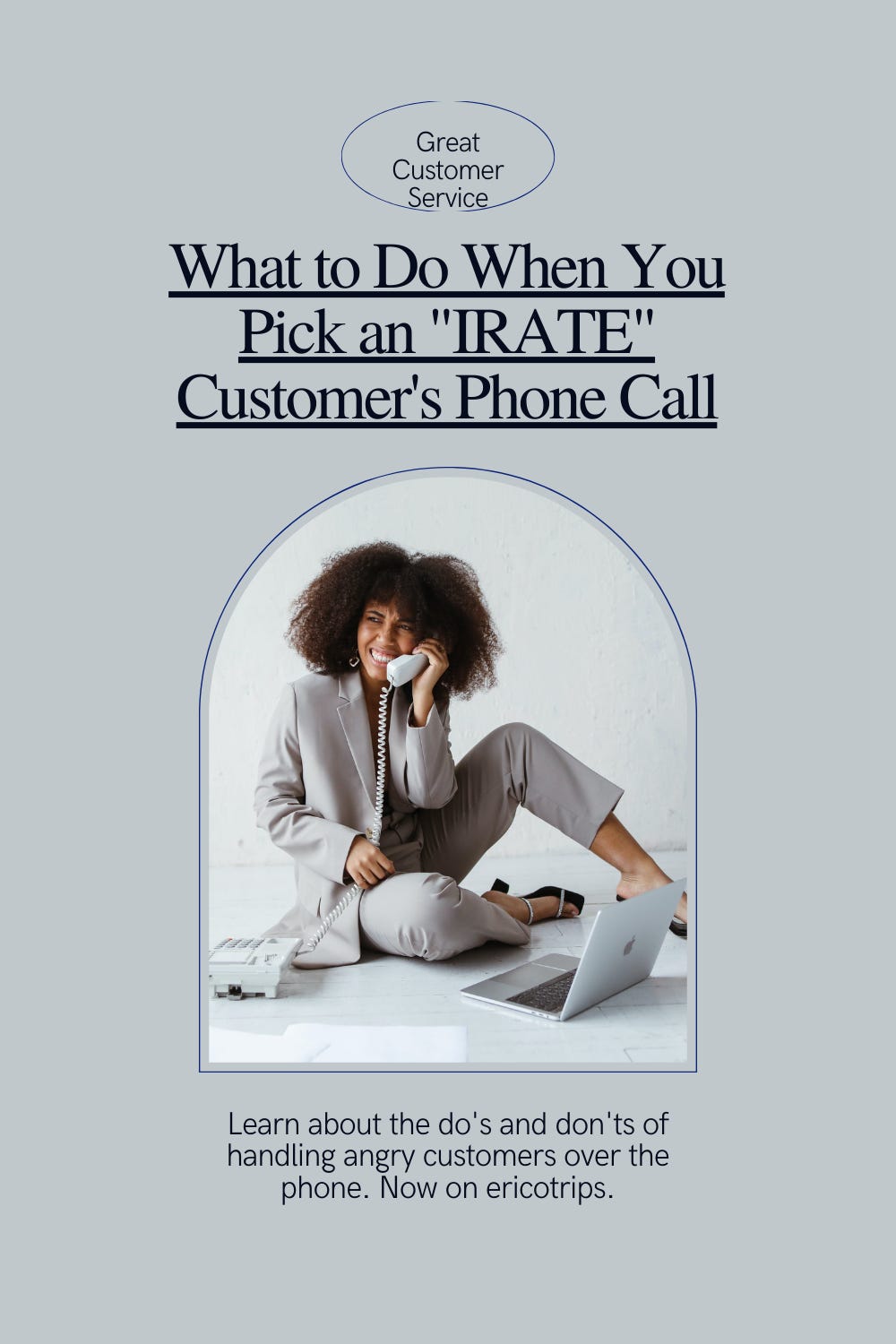What to Do When You Pick an "IRATE" Customer's Phone Call
6 actionable tips to help you manage angry customer interactions
I was reading an article (I can’t remember where) the other day and the author opined that customer-facing experts should view “irate” customers, who are often aggressive or demeaning over interactions as just regular customers exhibiting angry behaviours.
This means that you ought to strip irate customers of this negative persona and understand them as customers having a bad day or better still, dissatisfied.
And, could I relate?
Everyone is a customer to someone. Even when I had those terrible days when my orders arrived at the wrong address or a pending debit reversal from my bank to my account surpassed the 48-hour time frame, I was reasonably dissatisfied and angered.
My Customer-Facing Side of the Story
Working as a Customer Support Associate in financial services for a little less than a year, I’ve received my fair share of curses, harsh words, and unwarranted provocations over the telephone. And it’s not just finance, you know.
Dissatisfied or angry customers will always appear regardless of how great your product, service or solutions are.
What are the next steps? I’ll answer.
But wait. Some numbers to look at first.
According to call centre statistics from Time Doctor, 44% of customers report being annoyed or irritated when kept on hold for 5 to 15 minutes.
You see, what this tells us is while a few customers prefer to vent aggressively, it is also crucial to examine how elaborate your call centre or voice interactions are structured, for example.
If customers stay on queue for too long it only makes them angrier and angrier!
It’s terrible for your mental health as a customer-facing professional and also terrible for your company as 48% of consumers switched brands due to better customer service by other companies in 2022, per the same report.
The 6 Most Effective Ways to Manage Angry Customers on Telephone
Seek Positive Affirmations
It’s very easy to fall into the trap of thinking that those subtle jabs don’t affect your ego. Of course, you’ve probably been at this for years and it’s not the first time you’ve heard a customer call you idiot or cunt. However, I’d prefer you do not internalize these horrific utterances.
Stick to providing value to the best of your abilities and inform yourself that you are not these abusive remarks.
You can have a daily positive affirmation ritual before work.
After all, we’re getting big on affirmations nowadays. The Bible says, “For as he thinketh in his heart, so is he…”
Take Deep Breaths
WebMD defines deep breathing as a stress-handling technique to relax and let your worries go away for good. As the customer rants away, breathing deeply and not fuming yourself can help you provide better-composed and well-thought-out answers.
As you do this, time suddenly slows down. Just relax.
Mute the Mic
Even the best-behaved customer-facing experts may occasionally blurt out hints of grumpiness. And since it’s unethical to end customer calls without notice, a better way to handle the barrage may be to mute your mic!
This method benefits employees or business owners who are very expressive or have a low threshold for stress.
If it’s a smartphone, find the mute widget.
And if it’s a headset, maybe Realtek or Plantronics, it’s easy to locate the mute buttons. Few come with a light indicator that shows when you’re muted.
Feel free to rant in peace now.
Explain to a Colleague
This works well with the muted mics of course! While on a call with a dissatisfied customer, you can nudge colleagues around for assistance if you need any help.
It may be to double-check an account, confirm an order placement, or assist with an avid understanding of customer interactions.
Advisably, the interactions can be examined from the first point when a ticket was raised to the current state especially if it’s a mix of telephone, chats, and emails.
Following the call, involve the assistance of key stakeholders, product experts, or team leads to quickly resolve customer requests and ensure they are achieving goals and getting value thereafter.
Don’t be Coerced to Cut Corners
“Do you know who I am?!” “What’s your name?” “I know your MD, and I am telling you that everything I have said is accurate! I can’t wait for 24 hours!” It’s common to hear statements similar to these when speaking to angry customers.
And you know what? This is where the real test of handling customer engagements under pressure comes in, particularly in Nigeria where few customers may want to use their influence to force you to cut corners. Don’t do it!
Again, while trying not to inconvenience any customer or make their dilemma worse, it is crucial to follow the Standard Operating Procedures (SOPs) and Service Line Agreements (SLAs) of your organization.
Finally, if you feel lost, again, there’s never a wrong time to ask senior colleagues.
Be the First to Escalate
Customer situations can be tricky, yes?
You know, there will be instances where the customer has been passed across colleagues within your company and you can tell that his request hasn’t been treated in the right way, hence the delays and his justifiable anger.
If this happens, as the champion of customer success that you are, it may be a great time to escalate to concerned stakeholders. Follow whatever escalation process whether it involves sending emails, communicating in Slack channels, or whatnot.
The quicker recurrent requests are treated, the better for everyone. Remember the statistics I shared at the beginning?
In Conclusion
Anger is a natural emotion that stems from frustration, delays, or just a customer having a bad day in Lagos bottlenecks. It’s not in your place to urge customers to calm down or watch their tone.
Asking an already fired-up customer to calm down only makes things worse!
Instead, manage the conversation to the best criteria. You may provide alternatives like asking if they want a damaged order collected and replaced in so-and-so number of days. Yes, always give a timeline.
And in situations where the customer has been dissatisfied because of poor service, it is recommended that you empathize, not calm. Empathize with the customer and if your company gives incentives like discounts to such, now may be a good time to chip that in. It makes them happy and feel valued, trust me.
Avoid churn by every means and more importantly, do not interrupt the customer.
Okay? So, over to you.
How have you handled angry customer phone calls in past times and now? Kindly mention this in the comments.
“Stay Safe. Welcome to the Circus” - Hulk in Shang-Chi and the Legend of the Ten Rings (2021)












This is a great read